Key takeaways:
- Reparations politics aims to address historical injustices, reflecting a deep quest for justice, healing, and acknowledgment rather than merely financial compensation.
- Case studies, such as Germany’s compensation for Holocaust survivors and discussions on colonial reparations in the UK, highlight the complex emotional and societal implications of reparations.
- Types of reparations include financial compensation, land restitution, and symbolic gestures, each prompting important discussions about their effectiveness and long-term impact.
- The future of reparations in Europe emphasizes education, community empowerment, and the need for a comprehensive approach that addresses ongoing disparities rooted in historical injustices.
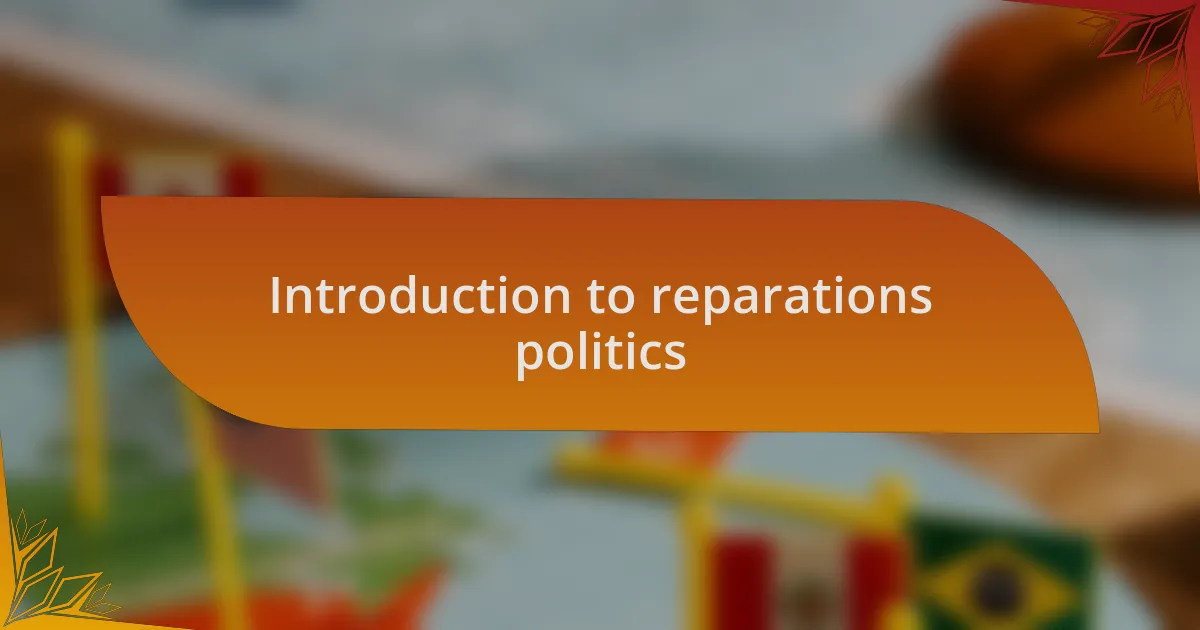
Introduction to reparations politics
Reparations politics is an intricate landscape that seeks to address historical injustices through compensation or acknowledgment. When I first encountered this term, I was struck by its emotional weight; it felt like a call to reckon with the past while striving for a more equitable future. Have you ever considered how our history shapes present realities?
Delving into this subject, I found myself reflecting on the ripple effects of colonialism and slavery that still echo in today’s societies. It became clear to me that reparations are not just financial transactions; they embody a deep quest for justice, healing, and recognition of pain. In discussions with friends and colleagues, I realized that many share a similar feeling — a mix of hope and skepticism regarding the effectiveness of these movements.
As I explored various instances of reparations across Europe, I began to grasp the diverse approaches taken by different nations. The emotional nuances in each story, whether of acknowledgment, denial, or delay, left a profound impact on me. It made me wonder: What does true reconciliation look like? How do we bridge the gap between past grievances and future harmony? These questions continue to fuel my understanding and engagement with reparations politics.
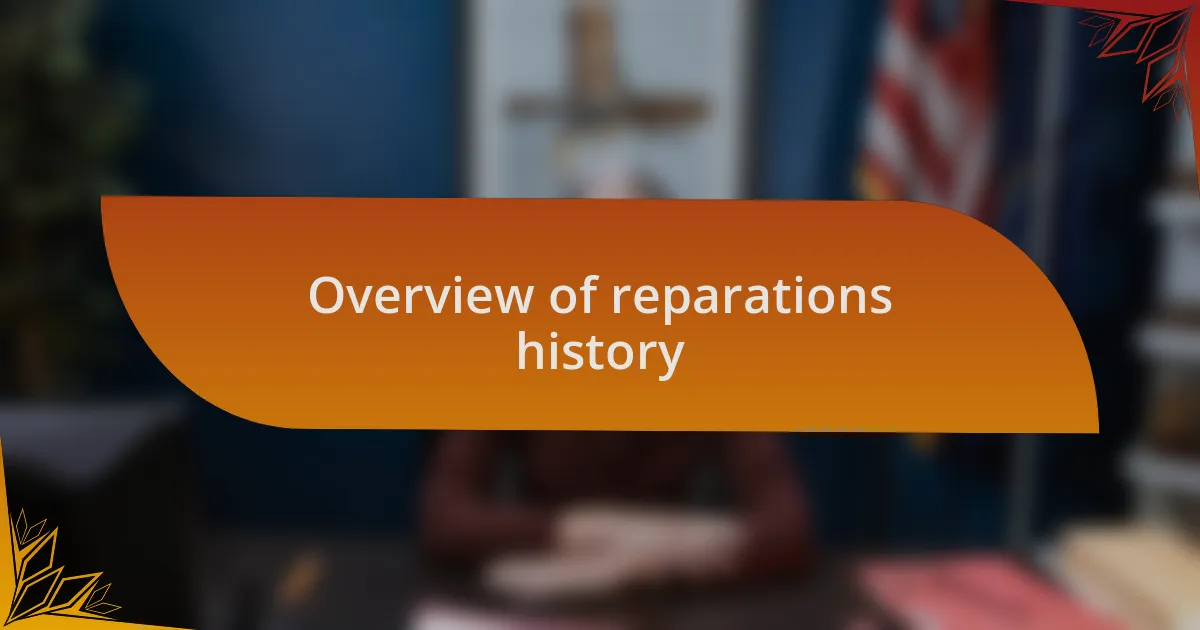
Overview of reparations history
Reparations have a long and complex history, particularly in Europe, where countries grapple with their colonial pasts. For instance, the aftermath of World War I saw Germany being held responsible for immense financial reparations under the Treaty of Versailles. I often think about the profound resentment that arose from this treaty—did it truly foster peace, or did it lay the groundwork for further conflict?
Later, in the wake of World War II, discussions around reparations emerged again, particularly regarding the Holocaust. Countries such as Germany initiated payments to victims and their descendants, yet the emotional weight of those reparations seems to evoke ongoing debates about adequacy and recognition. I’ve found that these conversations often elicit a spectrum of feelings; acknowledging past wrongs while reconciling them with the present is no small feat.
Looking at more recent debates, the call for reparations for slavery and colonialism has intensified in several European nations. I recall attending a panel where activists passionately discussed the need for reparative justice—not just as a matter of financial compensation, but as an essential step towards acknowledging historical trauma. It struck me then: how can societies heal if they remain silent about their past? The layers of this history continue to profoundly influence contemporary reparations politics, raising both hopes and questions about the future.
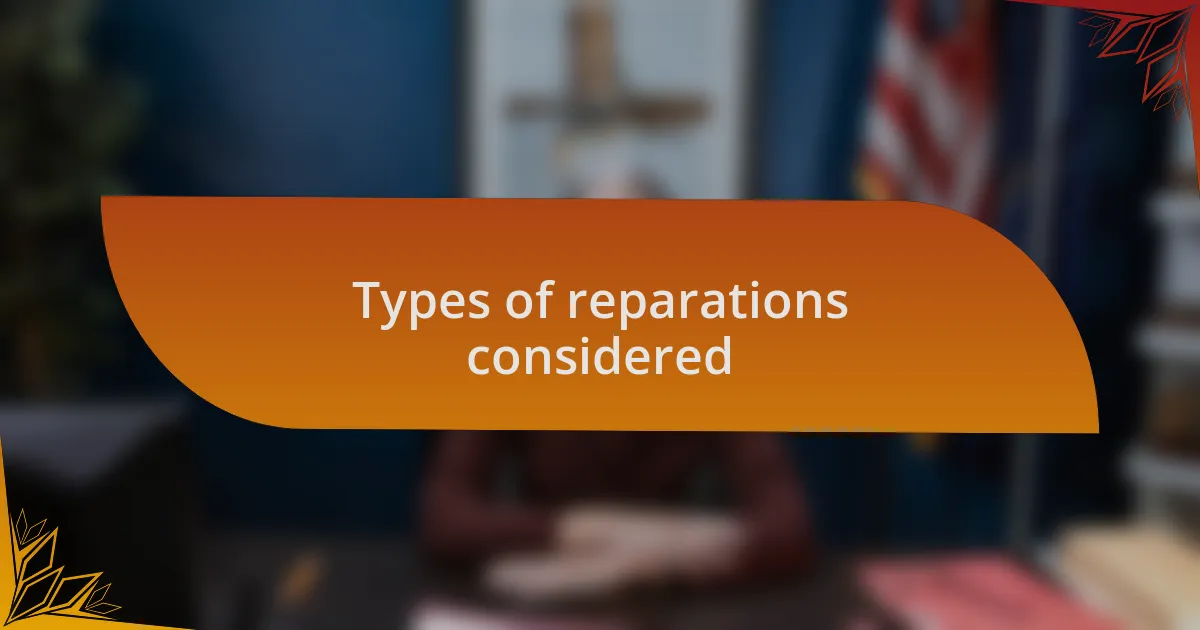
Types of reparations considered
When discussing types of reparations, a common category that arises is financial compensation. Governments might allocate funds specifically aimed at addressing historical injustices. I remember one discussion at a community gathering where individuals expressed mixed feelings about this approach; would merely putting money into a community truly address the deep-seated issues at hand? For some, it felt like a temporary fix rather than a meaningful solution.
Another form of reparations that merits attention is land restitution. In many cases, the return of land to its rightful owners can be a powerful statement of justice. I often reflect on the stories I’ve heard from those who have experienced displacement. Their narratives reveal not just a loss of property but a severing of identity and culture, highlighting how land and belonging intertwine in painful ways.
In addition to financial restitution and land returns, symbolic reparations play a significant role in the discourse. These might include public apologies, memorials, or educational programs aimed at raising awareness about historical wrongs. I once visited a memorial dedicated to victims of colonial violence, and it struck me how such remembrance can provide a community with a sense of acknowledgment. But I wonder, is a symbolic gesture enough to heal the wounds of the past, or does it merely serve as a reminder of unresolved grievances?
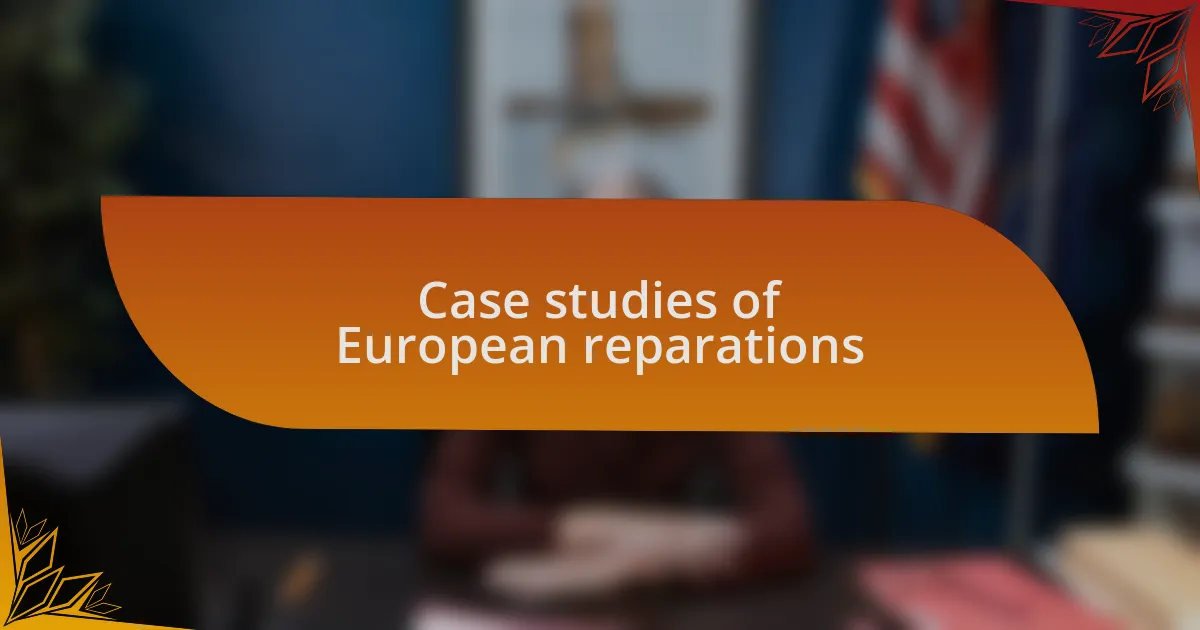
Case studies of European reparations
One compelling case study of reparations in Europe is the German government’s acknowledgment and compensation for Holocaust survivors. I recall attending a seminar where survivors shared their experiences of receiving financial compensation. While many appreciated the gesture, some expressed that no amount of money could truly compensate for the trauma endured. This raised a thought-provoking question: can financial reparations ever match the emotional toll of such historical atrocities?
Another notable example is the British government’s recent discussions regarding reparations for the legacy of colonialism. During a forum I participated in, a diverse group of individuals debated how such reparations could manifest. Some suggested educational initiatives to reintegrate lost histories, while others argued for direct financial aid to communities affected by colonial policies. It made me ponder – is it more effective to focus on community-driven reparations or to provide broader educational reforms aimed at enlightening future generations?
An often-overlooked aspect of reparations is the restoration of cultural heritage. The repatriation of artifacts taken during colonial times has gained traction, with several European museums beginning to return items to their countries of origin. I experienced this firsthand when visiting a museum exhibit that showcased these returning artifacts. I couldn’t help but feel a mixture of hope and skepticism: would repatriating these items genuinely mend historical fractures, or would they simply leave communities yearning for more?
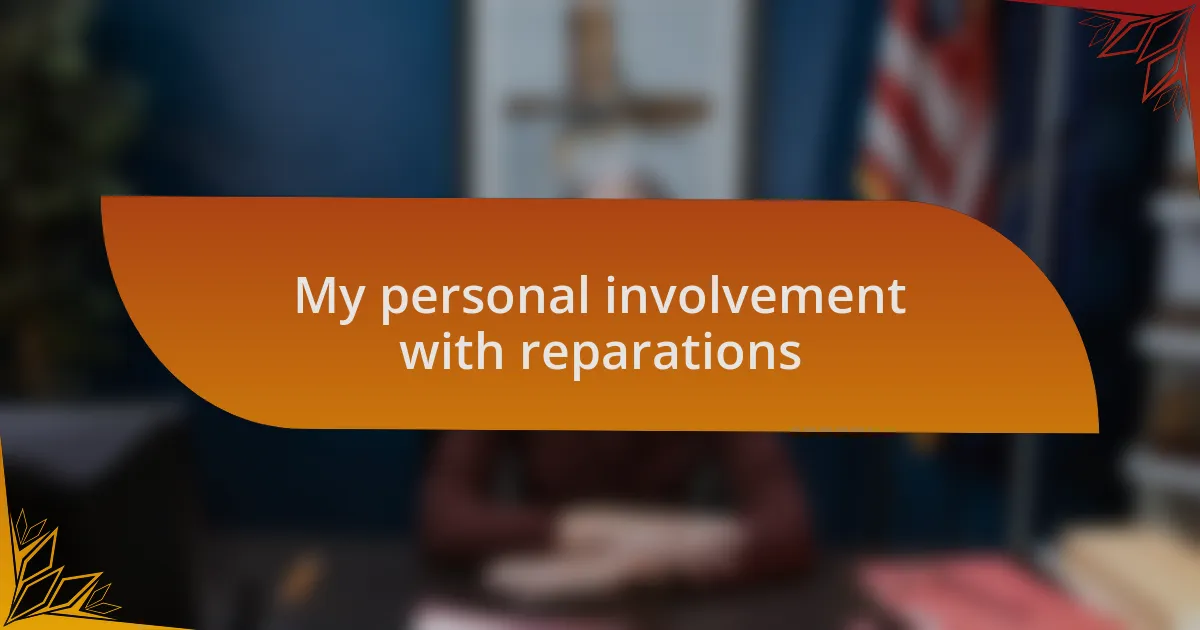
My personal involvement with reparations
My personal involvement with the reparations movement has been transformative. I remember joining a local group focused on raising awareness about the impact of colonialism. Those conversations were passionate, often spilling past the scheduled time as we delved deep into personal stories and shared moments of frustration and hope. Seeing so many people come together ignited a fire in me—how could we push for real change?
One memorable event stands out in my mind: I attended a community gathering where activists spoke eloquently about reparative justice. I found myself emotionally moved by the speakers’ stories, particularly one woman whose family had been affected by colonial policies. Her words lingered in the air, making me reflect: What does genuine restitution look like for those who have suffered so much? It’s a question I wrestle with, and it’s one that needs answers grounded in action.
I also engaged in discussions with policymakers about the potential for reparative initiatives. I vividly recall a debate where we explored various pathways toward reparations—financial compensation, educational reform, and even public apologies. These conversations fueled my passion for advocacy, as I realized that reparations aren’t just about money; they’re about acknowledgment and healing. What more could we achieve if we shifted the narrative from guilt to collective responsibility?

Insights from my experience
During my time in the reparations movement, I’ve noticed that each discussion brings new layers of complexity. I remember sitting in a café with fellow activists, each of us sharing our family histories tied to colonial legacies. It struck me how those stories, so personal and unique, intersected to form a collective narrative of struggle and resilience. How could we honor those stories while also advocating for practical change?
One afternoon, I had the privilege of interviewing a historian who dedicated her life to uncovering the truths of our colonial past. Her passion was infectious as she revealed how historical narratives have shaped our present. Listening to her insights made me realize that reparations are not just a financial conversation; they are about rewriting history to include the voices that have long been marginalized. Isn’t it fascinating how history can influence our understanding of justice today?
I also attended a rally where we demanded reparations as a starting point, not an endpoint. In that moment, surrounded by a sea of diverse faces and echoed voices, I felt a sense of unity that was both powerful and overwhelming. It made me reflect: What does solidarity mean in the face of such deep-rooted injustices? I believe it’s about standing together, advocating for a future where every story matters, and every voice is heard.
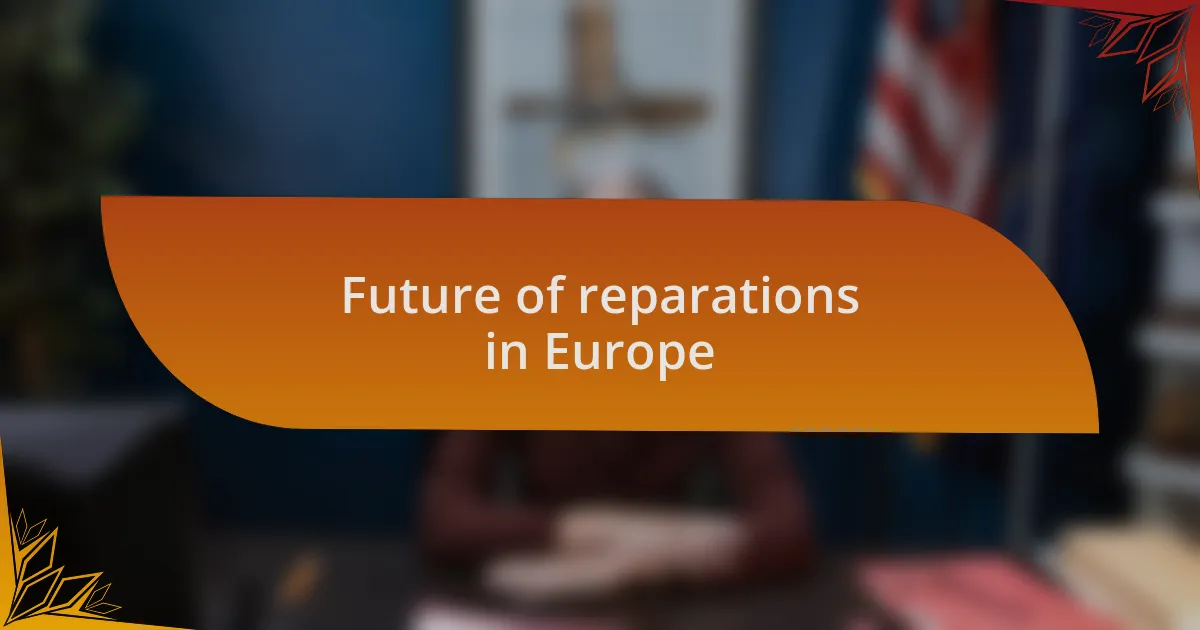
Future of reparations in Europe
The future of reparations in Europe feels increasingly urgent as more people engage in the dialogue. Recently, at a community forum, I shared my thoughts on how we can pave the way for reparative justice. It was heartening to see fellow attendees nodding in agreement, emphasizing that reparations must also involve education and awareness. How can we expect change if we don’t first educate ourselves and others about our shared history?
I was struck by a young activist who proposed a bold idea during a panel discussion: reparations shouldn’t merely be seen as financial aid but as a means to invest in community empowerment. Her passion reminded me of my early days in activism, where the focus was often on monetary compensation. Now, I see the importance of fostering sustainable growth and healing. How do we ensure that reparations translate into tangible benefits for future generations?
Looking ahead, I think it’s crucial for European nations to recognize the diversity of experiences surrounding colonialism. While attending an art exhibition centered on the legacies of colonialism, I felt an emotional surge as I connected with works that expressed pain and hope. That experience reinforced my belief that reparations must result in a comprehensive approach, addressing both the historical injustices and the ongoing disparities today. What steps can we take to ensure everyone involved feels seen and valued in this journey toward reparative justice?